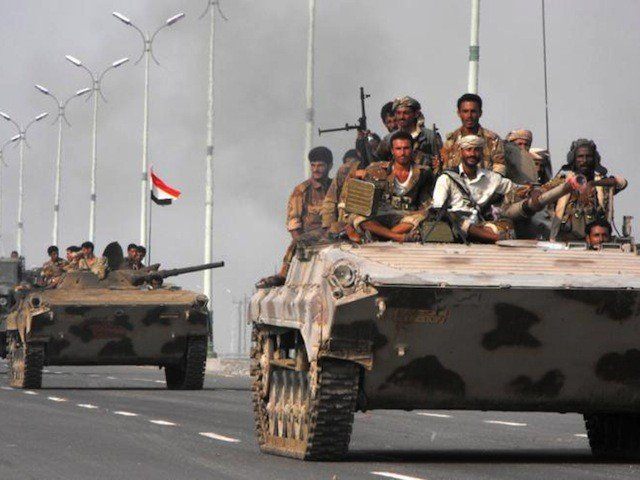This morning’s key headlines from GenerationalDynamics.com
- War in Yemen expands as Shia al-Houthis threaten new Sunni provinces
- Iran’s Rouhani challenges Khamenei in speech demanding reforms
War in Yemen expands as Shia al-Houthis threaten new Sunni provinces

Followers watch a televised speech by al-Houthi leader Abdel-Malek al-Houthi commemorating the birth of Prophet Mohammed in Sanaa on Saturday (Reuters)
We’ve been reporting recently on the growing war between Muslim tribes and sects that is threatening to engulf the entire Mideast, and Yemen is part of that trend. During 2014, at least 7,000 people were killed, including at least 1,200 civilians.
This last year saw the rise of the al-Houthis, an Iran-backed Shia tribe, originally from northwest Yemen on the border with Saudi Arabia. In September, the al-Houthi militias moved south and captured Sanaa, the nation’s capital, ousting the Sunni-led government. Since then, they’ve continued to take control of additional mainly Sunni provinces, and it’s now thought that the al-Houthis control about 70% of the army’s capabilities. It’s believed that the al-Houthis are being backed by former president Ali Abdullah Saleh.
The al-Houthis are opposed by two Sunni groups. One is al-Qaeda on the Arabian Peninsula (AQAP), currently considered to be the most dangerous branch of al-Qaeda. The second is the Islamist Al-Islah movement, a collection of Sunni tribes that have lost power since the Houthi takeover, and who are now cooperating against AQAP against the al-Houthis.
There’s a third power center — a growing secessionist movement in the south. Prior to 1994, North Yemen and South Yemen were two separate countries.
The international community had hoped that Yemen would be stabilized by a peace plan agreement made last year in February to divide the country into six federally organized regions. However, al-Houthi leader Abdel-Malek al-Houthi announced in a televised address on Saturday that he was completely rejecting the peace agreement. “Beware of any attempts to overthrow the revolution,” he said. Al-Arabiya and AP and AEI Critical Threats Project
Iran’s Rouhani challenges Khamenei in speech demanding reforms
Iran’s President Hassan Rouhani on Sunday called for an end to the country’s international isolation by curbing corruption and mismanagement with reforms that are opposed by Supreme leader Ayatollah Seyed Ali Khamenei and by the Islamic Revolution Guards Corps (IRGC). According to Rouhani:
Our economy will not prosper as long as it is monopolised (by the government). The economy must be rid of monopoly and see competition.
It must be freed of insider speculation, be transparent, all people must be aware of the statistics. If we can bring transparency to our economy, we can fight corruption.
Our political life has shown we can’t have sustainable growth while we are isolated.
Rouhani has threatened to call a national referendum if he can’t pass the reforms he is demanding:
As the enforcer of our constitution, I would like, even for once, to see conditions ripe to implement a tenet of the common law calling for major issues – economic, social, political and cultural – to be put to public referendum rather than parliamentary vote.
Some 36 years have passed now and this article has not been enforced even once.
From the point of view of Generational Dynamics, Iran is in a generational Awakening era, just one generation past the 1979 Great Islamic Revolution and the Iran/Iraq war that ended in 1988. There is a “generation gap” splitting the hardline survivors of the crisis wars from the younger generations growing up after the war. This is similar to America in the 1960s, when there was a generation gap between the World War II survivors and the generations growing up after the war.
KEYS: Generational Dynamics, Yemen, al-Houthis, Abdel-Malek al-Houthi, Al-Qaeda in the Arabian Peninsula, AQAP, al-Islah, Iran, Hassan Rouhani, Ayatollah Seyed Ali Khamenei, Israel, Islamic Revolution Guards Corps, IRGC
Permanent web link to this article
Receive daily World View columns by e-mail

COMMENTS
Please let us know if you're having issues with commenting.